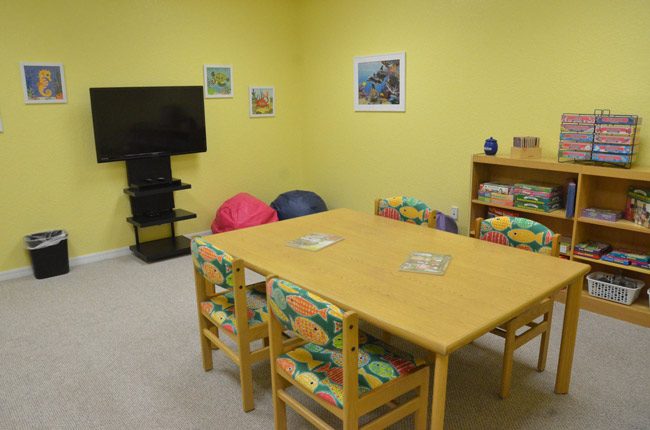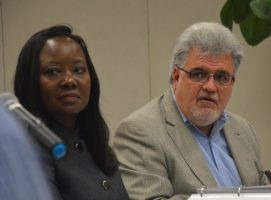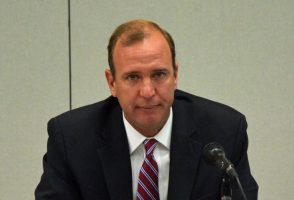
Until two years ago abusive parents who still had the right to spend time with their children, under supervision, had few options in Flagler County, if any.
“Visits really wouldn’t happen or if they did happen they were done out by the flagpole by the court with really no supervision,” said Eric Losciale, program director of the Children’s Home Society, referring to the flagpole in front of the county courthouse. “You had a high risk of the kid being abducted or the violence continuing. What Sally’s Safe Haven does is eliminate that.”
Sally’s Safe Haven is a small facility occupying part of what used to be the Bunnell branch of the public library, on State Road 100, just west of the Flagler Playhouse. “It provides a safe environment for children to visit parents, the non-custodial parent, that is, the alleged perpetrator of the domestic violence or the child abuse that is happening,” Losciale said.
It’s now a non-descript facade with just the name of the facility identifying it outside. The soberness is deceiving. The rooms inside, at least where children meet with their parent, are colorful, appeasing, comfortably furnished, stocked with children’s games and a television screen in each. The layout of the facility ensures that children and their guardians come in through one door, parents under restrictive orders come in through another. The two sides never meet except under strict supervision, and only if the child is willing. The meetings are videotaped, and security is constant.
“During the visit we can redirect the parent if they say something inappropriate and we’re really able to eliminate the emotional abuse that might be happening with that child,” Losciale said. The court gets a written report after each visit, and can make an informed decision at some point if there is any possibility of resuming non-supervised visits, or if there is a reunification between family members.

“Whenever anyone visits our facility from any other facility they really admire the place and look up to it and go, this is really a premier facility,” Sherman said. “We will be receiving some visits from the feds ion the near future to look at the facility now that it’s in operation. I’d like to acknowledge the board of County Commissioners and our internal general services staff who did the internal renovations. They were so engaged and understood so much about the facility and the services it was going to provide,” to the point that they re-engineered some of the internal construction to ensure maximum safety for the users of the haven.
The haven is currently serving 23 families and hosting 23 to 35 one-hour supervised visits per week. Half the cases involve domestic violence. To date, 97 families have been served through the haven, out of 121 referrals from judges, the Family Life Center and children’s protective services in the county. The county was just turned down for an additional $400,000 grant. But it still has $100,000 from the original grant, ensuring at least two years of operation at the haven. By then, Sherman is certain, the county will have been approved for a new grant.
Last Wednesday, Sherman, Revels and others gave a state-of-the-haven presentation to the Public Safety Coordinating Council, the county’s advisory board of judicial, law enforcement, government and social service agencies, where Zambrano had first spoken of the initiative years ago. It was a one-hour window into the consequences of trauma–from physical, psychological and sexual violence–that children suffer, but that few people outside those situations are aware of. Losciale had begun his presentation by showing a video public service announcement on domestic violence, an episode of violence disturbingly seen through the eyes of a child. (See the video to the right.)
He then described some of the challenges that sometimes have a way of uncomfortably tainting even visits at the heaven. “We had a case where the father was visiting his 6-year-old daughter, or a 5-year-old daughter,” he said, “and they wanted to play Candyland. That seems a pretty normal thing to do, and we certainly had Candyland there. Well, we found out that every time they played Candyland before all of this happened, that was the trigger. Right after Candyland was played is when the sex abuse happened. So we need to get this information because we don’t want to re-traumatize the children by just an innocent thing, here’s Candyland, let’s play. Another thing where the father brought in a birthday card, it was a child’s birthday, a different case, the 6-year-old girl visiting and it’s her birthday, balloons, and here’s a birthday card. So we need to check everything before it’s given to the child. We open the birthday card before it was given to the child, in the birthday card was the father writing out for the child to recant the sex abuse that happened instead of ‘happy birthday, Dad, love, dad.’ So people are very clever, very conniving people.”
Even a father’s nickname for his daughter–“my little princess”–was in one case found to be a trigger: “Every time he called his daughter ‘my little princess,’ that’s when she knew the sex abuse was going to happen,” Losciale said. “So we try to get as much case information as possible, so we’re able to set a safe environment, nurturing environment.”
In March, Revels had traveled with Sherman to Washington for a conference on ending violence against women. At least week’s meeting of the safety council, she unearthed notes she’d kept from that trip to recall the ultimate goal–“envision a world where gender-based violence is unacceptable; where perpetrators are held accountable, and victims receive the compassion, support and justice they deserve,” Revels had written. “It was not uncommon to sit in a plenary session and look over to see someone shaking, crying or have to leave the room, as the details were [too] graphic for education. Many that work in this segment of rescue, care and processing are past victims that use their work to heal however they can. So many victims were there.”
Key to ending that cycle of violence is ending the transmission of the impulse to violence from abuser to victim, who then becomes abuser in turn.

“You’ve got to look at what’s the root cause of all this, how do we end this, how do we stop this,” Smith said. “What if 25 or 30 years from now, that child is no longer the child sitting there but he’s actually the abuser, and how do you stop that, and how do you end that? It’s not easy. But I think one of the things they tried to impress upon us is OK, we’ve got to work with these abusers. We can’t just wash our hands. It’s the first reaction, it’s the natural reaction when you hear something like that and the anger that comes out. But that’s not going to end it, that’s not going to stop it.”
Smith refers individuals to the haven. But before he does so, he spends time ti the abuser. “I talk to him a little bit, and I explain to him why this environment is important, why it’s important to go under the supervised visitation center and reconnecting with your child,” the judge said. “We need to really focus on these children. I think that’s the key, because if we’re really going to end this, number one we have to rehabilitate the abuser himself so that if he ends up in new relationships it doesn’t happen in the future. But number two, we need to think about these kids and what we can do to help them, especially when it comes to the relationship with their father, with the abuser themselves, because that sometimes is important to open up that dialogue, make them feel comfortable, make him understand what was so wrong about what he had done, what the father had done, and trying to give them some tools to hopefully they don’t become abusers themselves down the road.”
![]()
Sally’s Safe Haven at Year 2: A Report
Click to access sallys-safe-haven-year2.pdf





























Leave a Reply